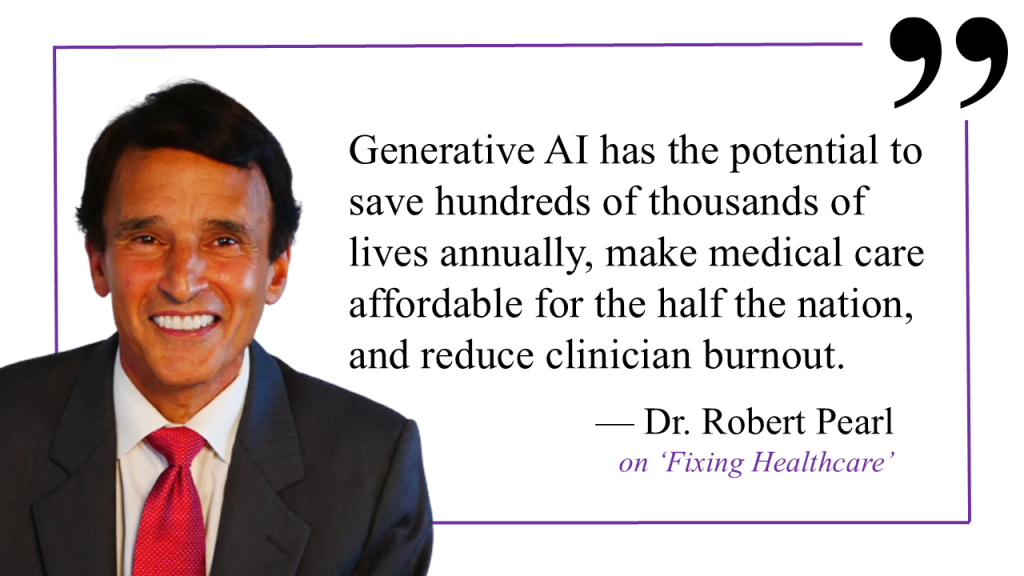Podcast: Play in new window | Download
Subscribe: Spotify | Email | RSS | More
In a special episode of Fixing Healthcare, Jeremy Corr flips the script and interviews fellow cohost Dr. Robert Pearl, who shares his expert view on the three most important technologies shaping the future of American medicine.
This conversation is part of Season 10’s exploration of tech-enabled healthcare transformation, featuring CEOs and leaders of healthcare leaders at major tech companies like Nvidia, Google, Oracle, Microsoft and Hippocratic AI. The season has showcased how leaders in the field are approaching the digital revolution in medicine. Now, it’s Pearl’s turn to offer his unique perspective—nearly one year after the release of his bestselling book, ChatGPT, MD: How AI-Empowered Patients & Doctors Can Take Back Control of American Medicine.
Pearl identifies three game-changing technologies:
1. Large language models (LLMs) like ChatGPT
Pearl calls these “the most significant breakthrough,” capable of offering patients real-time medical expertise and ushering in a new era of healthcare consumerism.
He shares several stories—including one about a CEO who used ChatGPT to identify his daughter’s rare illness in seconds—that illustrate the power of LLMs to close diagnostic gaps and empower patients with expertise in unprecedented ways.
2. Telemedicine as the perfect complement to AI
Pearl describes telemedicine as a “complementor,” a technology that, when paired with another (in this case, generative AI), becomes far more powerful than either could be alone. While AI can monitor patients 24/7 and identify emerging health issues, only telemedicine can instantly connect those patients to a human clinician for evaluation and care.
“The synergy of the two will be capable of overcoming the limitations and challenges of both time and distance,” Pearl explains. Together, these complementors can deliver real-time, personalized care while reducing costs and expanding access, especially in underserved and rural communities.
3. ‘Derivatives’ trained on distillation & real clinical interactions
Pearl introduces a new class of AI-powered assistants designed to manage chronic diseases, perform triage and monitor patients at home. These tools, built through “knowledge distillation” and trained on actual clinician-patient exchanges, could help prevent hundreds of thousands of heart attacks, strokes and other major complications from chronic disease every year.
Pearl also addresses concerns about bias, liability and job displacement. He argues that AI won’t replace doctors but will change their roles, reduce burnout and make healthcare more affordable for everyone.
Additionally, Pearl praises the foresight of prior Season 10 guests while also pointing out that most focused on today’s tools (like documentation automation) rather than imagining the radically different world five to 10 years from now. Pearl believes generative AI will go far beyond helping doctors with administrative tasks. It will empower patients, reduce costs improve outcomes, and shift the balance of power in healthcare.
Click play to hear this wide-ranging, insightful discussion about the digital future of medicine.
* * *
Fixing Healthcare is a co-production of Dr. Robert Pearl and Jeremy Corr. Subscribe to the show via Apple, Spotify, Stitcher or wherever you find podcasts. Join the conversation or suggest a guest by following the show on Twitter and LinkedIn.

